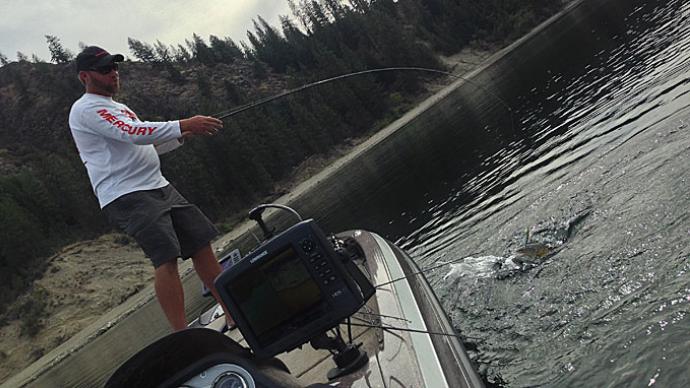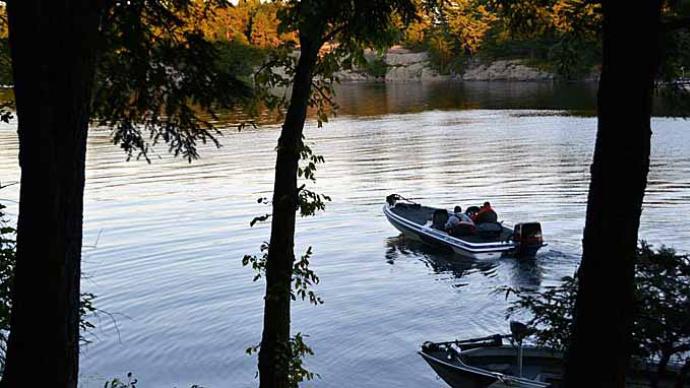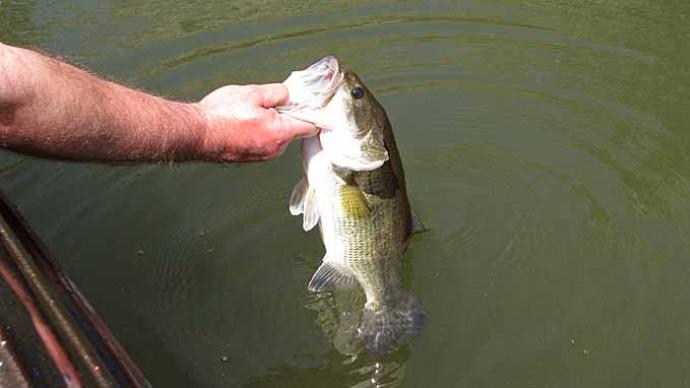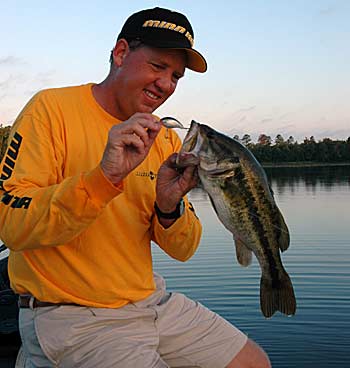
Whether competing at the national or regional level, today’s tournament anglers encounter a variety of fisheries on the circuit trails that challenge their abilities to adjust to the circumstances.
Becoming more versatile is the route the most successful tournament anglers take when facing a schedule filled with events on deep, clear reservoirs and shallow, murky impoundments and rivers. However, trying to master every technique known to bass fishing isn't the key to becoming a versatile angler. "When I say versatile, that means expanding your strengths," discloses Alton Jones, a Major League Fishing (MLF) pro from Texas. "I think it is important to expand your strengths to include more than one technique."
Jones believes anglers should fish their strengths when money is on the line. "If you look at the guys who have been successful--the big-name guys--you can pinpoint a technique in which they shine," says Jones, who lists such examples as David Fritts with a crankbait, Tommy Biffle with a jig, and Kevin VanDam with a spinnerbait. “All of these guys are versatile, too, but if you look at how they win, it is doing something they excel at."
Jones considers his strengths sight fishing and pitching and flipping soft plastics and jigs to visible cover. Hence, during practice and competition days, the touring pro concentrates on these techniques that he believes he can win with rather than trying tactics that are working for the rest of the competition. In addition, Jones uses his open weeks or the off-season to learn new techniques when he wants to increase his versatility.
Tackle Warehouse Pro Circuit competitor Matt Reed follows the same philosophy as Jones when competing. "I would rather fish my strengths on any lake that I can," says Reed. "Sometimes you really can't, but any time you can make it work into a situation where you can survive, you are better off doing what you are comfortable doing."
Reed honed his skills fishing hydrilla on Texas reservoirs Sam Rayburn and Toledo Bend. He believes his strengths are flipping jigs and soft plastics into grass, running a spinnerbait along the weed edges, and deep cranking structure.
Both pros believe tournament competitors should try their strengths in practice on most bodies of water. "Otherwise, you may give up on your strengths too early when you could have been successful at it, and then you are trying to go up against someone else's strengths," warns Jones. "If I am going to play a game, I want to play it according to my terms."
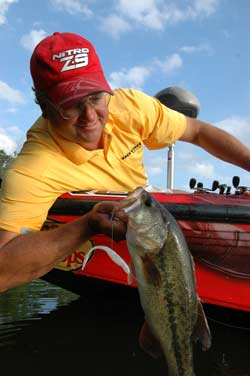
Jones prides himself on finding fish in practice that allows him to play on his terms. "Whatever your strength is on almost any given body of water at any time somewhere, there are some bass that you can catch on your strengths," advises Jones. "Tommy Biffle is the king of it. He will decide before he gets to a tournament if he will catch them on a jig. He will continue to search for three days of practice until he finds a school of bass that intersects his strengths.”
If weather and water conditions hamper their style of fishing, both Jones and Reed adjust to their strengths rather than try unfamiliar tactics. The first adjustment Jones makes to his fishing style is changing line size. In most situations, he pitches and flips with a main line of 30-pound braid and a leader of 20-pound test fluorocarbon, but if the fish seem to be line shy, he scales down to 12-pound test, and in severe conditions, he resorts to 6- to 8-pound line and spinning gear with a shaky head jig or a drop shot. He still fishes the same target but tries the spots with finesse, soft plastics, and jigs.
Reed also scales down on line, and his strength baits if the going gets tough. "I don't mind downsizing on line," says Reed. "I am comfortable with having a fish on light line. However, I am not comfortable fishing drop-shot tactics and those kinds of things." So instead, Reed downsizes his jigs or spinnerbaits, sometimes throwing a 1/8- or 1/4-ounce blade bait in clear water.
Another adjustment Jones makes to his strength is to increase the size of his lure. “I find many times in clear water when everyone else is adjusting their stuff down, sometimes the thing to do is just the opposite,” says Jones. “What that change does for me is trigger a reaction bite." If a 1/2-ounce jig has been productive, but the bite turns off rather than scaling down to a 3/8 or 1/4-ounce version, Jones ties on a 1-ounce jig.
The Texas pro believes the heavier jig falls faster, causing a bass to inhale the lure before it reaches the bottom. It also allows Jones to present his lure quicker to the strike zones. "Many times if I can get a bite by adjusting up in weight, it is usually a big fish," reveals Jones.
The pros usually make adjustments to their strengths sometime during their practice. However, making the proper adjustments before the competition begins could be the key to victory. "That is what separates the men from the boys as far as someone who can fish their strengths," says Jones.
Reed can usually tell early in practice if he needs to make any adjustments. "Generally, the first day, I will see if I can get it done that way, and then I may have to throw it down and spend time trying to figure out how to survive," he says. "In practice, if you can't get anything going, you must change it to survive. Sometimes you have to bail out on how you think you can do well and go into a survival mode for points."
No matter what conditions they encounter along the tournament trail, Jones and Reed know they can adjust their style of fishing and continue to employ their strengths rather than resort to unfamiliar local tactics to catch bass.


